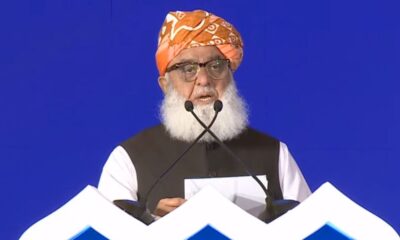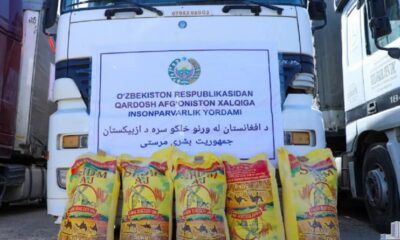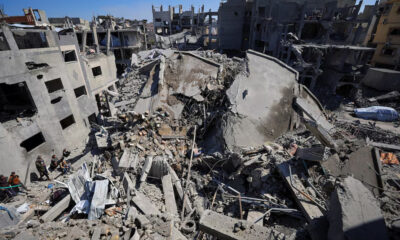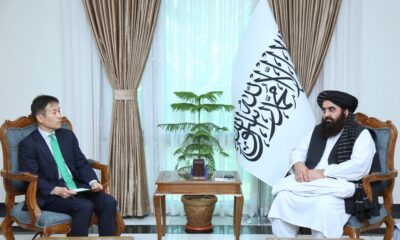Latest News
Rights watchdog calls on Pakistan to ‘immediately stop’ forced deportations of Afghan refugees

Human Rights Watch (HRW) on Wednesday called on Pakistan to immediately stop forcing Afghan refugees to return home where they struggle to survive amid Afghanistan’s soaring unemployment, broken healthcare system, and dwindling foreign assistance.
In their latest report, HRW slammed Pakistan for having stepped up pressure on Afghan refugees and using “intensified abusive tactics” to get them to leave the country.
Elaine Pearson, Asia director at Human Rights Watch said:.“The Taliban (Islamic Emirate) authorities in Afghanistan should prevent any reprisals against returning Afghans and reverse their abusive policies against women and girls.”
The organization stated that the human rights situation in Afghanistan has continued to deteriorate over the past three years
On January 31, 2025, Pakistan’s Ministry of Interior announced that Afghans without official residence documents, along with holders of Afghan Citizen Cards, must leave the cities of Islamabad and Rawalpindi or face deportation. Afghans holding Proof of Registration (PoR) cards must leave by June 30.
A previous wave of deportations and expulsions, from September 2023 through January 2024, drove over 800,000 Afghans – many born in Pakistan or living there for decades – to Afghanistan. Since November 2024, Pakistani authorities have renewed pressure to expel Afghans. More than 70 percent of those returning have been women and children, including girls of secondary school age and women who will no longer have access to education.
HRW stated that Pakistani police have raided houses, beat and arbitrarily detained people, and confiscated refugee documents, including residence permits.
They have demanded bribes to allow Afghans to remain in Pakistan. The United Nations reported that most Afghans who have returned to Afghanistan have cited fear of detention by Pakistani authorities as the reason they left.
HRW stated that many of these refugees are at risk of persecution if they return – including the former government’s security forces.
“Human Rights Watch and the UN have documented extrajudicial killings, enforced disappearances, arbitrary arrests and detention, and torture and other ill-treatment of people affiliated with the former government’s military and police forces, some of whom had returned to Afghanistan after first seeking refuge in Pakistan,” the report read.
Returning refugees meanwhile have generally had to abandon property and savings in Pakistan, and have few livelihood opportunities or little land in Afghanistan.
HRW also stated that Pakistan’s coerced returns, expulsions and deportations of Afghans may amount to violations of Pakistan’s obligations as a party to the UN Convention Against Torture and the customary international law principle prohibiting refoulement, or forced return to a place where they would face a genuine risk of persecution, torture or other ill-treatment, or a threat to their life.
Germany and other countries have also put Afghans at risk by deporting them to Afghanistan, the HRW report stated.
“Afghanistan is not safe for any forced refugee returns,” Pearson said, “Countries that pledged to resettle at-risk Afghans should respond to the urgency of the situation in Pakistan and expedite those cases.”
As of the start of 2025, Afghans were one of the world’s largest refugee populations, numbering 6.4 million. Many Afghan refugees in Pakistan have lived there since the war in Afghanistan began in 1978. Continuing instability, including the takeover of Afghanistan in August 2021, have driven 1.6 million more Afghans to neighboring Pakistan and Iran.
Latest News
Dried fruit market in Herat booms ahead of Eid-al-Fitr

As Eid al-Fitr approaches, the dried fruit market in Herat province has thrived, with people busy purchasing Eid sweets. Families are striving to buy sweets according to their economic capabilities in preparation for this holiday.
However, this year, people’s economic situation has worsened, and they are unable to make purchases as they did in previous years.
Nevertheless, the customs and traditions of Eid compel most families to prepare for the holiday.
“Thank God, there is a lot of crowds. Sales are high. People are in the market until 1:00 AM, buying. This year, by the grace of God, prices are low, and everyone can afford to buy,” said Ayatullah Habibi, a shopkeeper in Herat.
Although dried fruit prices are cheaper this year compared to last year, many people still cannot afford to buy them.
“We are almost hopeless about our lives; there is no business, and the situation is bad,” said Ghulam Sarwar, a worker in Herat.
Meanwhile, the Herat municipality has announced the creation of a price control commission in recent days.
Herat municipality stated that dried fruit and food markets are being monitored daily by the commission members.
Meanwhile, the Union of Dried Fruit Sellers in Herat also emphasized that prices are better compared to last year.
“There is ongoing supervision in the market to ensure good quality goods and fair pricing. Any shopkeeper who sells poor-quality goods will have their shop closed,” said Abdul Ghani Qadri, the head of the Dried Fruit Sellers Union in Herat.
While many people are eagerly awaiting Eid al-Fitr, there are still many families whose primary concern is feeding their children.
Latest News
36 mining contracts inked over the past year: Mines ministry

The Ministry of Mines and Petroleum says it has signed 36 large and small mining contracts, with a total value of $1.3 billion over the past year.
Officials from the ministry stated that these contracts include 10 large mines, 25 small mines, as well as projects related to cement, salt, marble, and a major gas extraction contract with Uzbekistan, all signed with both domestic and foreign companies.
Meanwhile, economic experts have emphasized the importance of increasing investments in the mining sector for the country’s economic growth. They have stressed that priority in mining contracts should be given to domestic companies.
“It is better to prioritize domestic investors over foreign ones,” said Kamaluddin Kakar, an economic expert.
In the meantime, members of the private sector also stated that if both foreign companies and Afghan investors can partner in the mining sector, this will not only foster investment development in the country but also bring positive changes in capacity building within the mining extraction sector.
Latest News
US may ask for military equipment left behind in Afghanistan: Trump

Speaking at an event on Women’s History Month, Trump said that the Biden administration gave much of the US military equipment to Afghanistan, worth billions of dollars.
“Maybe we will have to ask for that back, although it is getting a little old now. We are building new stuff,” he said.
Trump had earlier said that if Afghanistan wants aid from America, the Islamic Emirate must return US military equipment left behind during the 2021 troop withdrawal.
However, the Islamic Emirate has said that the equipment it has seized is war spoils and will not be returned.
-

 International Sports4 days ago
International Sports4 days agoIPL 2025: Sunrisers on a batting rampage; triumph over Rajasthan Royals
-

 Latest News4 days ago
Latest News4 days agoEU says girls’ education crucial for Afghanistan’s long-term prosperity
-

 Sport4 days ago
Sport4 days agoACB names Afghanistan A squad for tri-nation series
-

 Latest News5 days ago
Latest News5 days agoPakistan’s mistakes played significant role in rise of terrorism: Maulana Fazl-ur-Rehman
-

 Latest News4 days ago
Latest News4 days agoUzbekistan sends essential food aid to Afghanistan
-

 International Sports3 days ago
International Sports3 days agoIPL 2025: Last over drama; Ashutosh Sharma clinches win for Delhi Capitals
-

 Sport3 days ago
Sport3 days agoAfghanistan eliminated from Asian Beach Soccer Championship
-

 Regional3 days ago
Regional3 days agoEgypt makes new proposal to restore Gaza truce as Israeli strikes kill 65
























